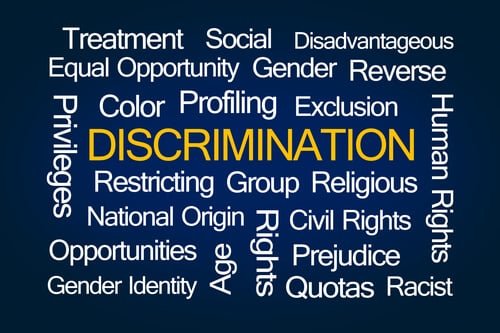

If we don’t win, you don’t pay.
NO WIN – NO FEE

ON CALL 24/7

U.S. Marine

Welcome to Ehline Law Firm. We help protect afflicted people all across the State of California. Also, we have only seasoned and experienced personal injury lawyers in Los Angeles here.
Most of all, we help people harassed or discriminated against at work.
California and federal laws prohibit employers from discriminating against employees. One major discriminatory practice is when employers violate an employee’s religious beliefs or practices. This creates a hostile work environment.
Ehline Law Firm assists injured people like you in getting money for your injuries. We have recovered millions of dollars for victims just like you.
What Are Some Religious Practices Employment Discrimination Examples?
Discrimination
What is a Sincere Religious Belief?
Religious belief is not limited to one religion. And what a slippery slope it is for an employer to know what is and what is not a “sincerely held” spiritual mindset.
After all, it covers all faiths whether:
- Christian
- Jewish
- Muslim
- Buddhist
- Hindu
- Sikh and others.
The law protects employees of all recognized faiths. Faith includes beliefs and practices associated with religion.
Are Atheists Also Protected from Discrimination?
Laws also afford protection against discriminatory treatment based on no beliefs.
- So yes, it includes protection from religious discrimination against atheists.
And these are people who do not have religious beliefs or practices at all. To the contrary, they have faith that there is no God at all. Some say these people are also part a faith based religion.
California law details religious protections as any traditionally recognized religion. It encompasses sincere beliefs, practices or observations.
So things like violating an employee’s religious practices or dress code can be violative of its provisions.
- Sometimes employers may pretextually try and ban facial hair or head coverings. This is usually wrongful behavior.
But it runs both ways.
-
- So a Muslim employer cannot force a Christian woman to cover herself.
He may not threaten her with a beheading or honor killing either.
- Hence, he may not use traditional Sharia law to violate her rights as a woman.
Discrimination happens when an employer fails to protect employee religious rights. So this is a form of individual harassment in the workplace.
And as can be seen, it can cut both ways. Balance must be maintained between what is reasonable for everyone.
Does the Duty to Accommodate Only Go So Far?
Employers have a duty to accommodate an employee’s religion. Obvious cases are when an employee gets terminated based on religious beliefs. American employees cannot get forced to participate or get excluded from religious activity.
If it is within the workplace, employers must respect religious choice. Other examples include exclusion from or getting forced to attend a Christmas party.
Faith in a religion cannot be a condition of their employment or performance reviews. The employer has a duty to accommodate the employee’s reasonable beliefs.
What Accommodations Are Reasonable?
Accommodations in the workplace must allow the employee to practice his or her religion.
- Arrangements could be a job reassignment.
- It may mean lateral transfers and flexible scheduling.
- Reasonable work-related procedures or policies may be the simple solution.
The employer’s prohibition is from treating an employee or applicant as better or worse than another. They also cannot impose different or more work requirements. Hence, they must judge a person solely on performance.
Courts in California have set certain standards. They use the following factors to determine if a belief gets protection, including:
- The religion must be external. Or it must surface analogize to traditional religions. This includes formalities such as having clergy. It also includes services, ceremonies, and other measures.
- Religion must address fundamental questions involving deep and imponderable matters.
- The religion must be comprehensive. It must also not consist of isolated teaching.
What About Laws Protecting Religious Beliefs and Practices?
As discussed above, discrimination by employers due to religious beliefs is illegal. It is illegal under both federal and state law in California. (See eg., Title VII of the Civil Rights Act of 1964.) Provisions are there to protect the employee. It charges a duty to the employer to provide reasonable accommodations.
There is a stipulation. This accommodation must not cause the employer undue hardship. It is unlawful for employers to discriminate in the “terms or conditions of employment.” Under California law, this is anything related to the employee’s job.
- This includes the employee’s position, hours, title, and benefits.
What About Pay Reductions and Other Employer Shenanigans?
So now we look at lowlife employers doing things pre-textually in order to terminate you constructively. This can include shenanigans like pay reductions and other issues related to their job. Religious discrimination may only be a part of the problem. It can include other types of discrimination. It can encompass racial and ethnic discrimination.
-
- Many cultures have national religions and practices.
These practices may not be similar to the mainstream American culture.
-
- Atheists must take this into account sometimes.
For example, it is not discrimination when the company holds religious celebrations.
- Typically this includes Thanksgiving.
- It also includes Easter parties or the annual Christmas party.
The general rule is that a religious holiday-type party does not go against an atheist’s non-religious beliefs. It is a celebration for all employees. In fact, it is legal for the business to have symbols related to the Christian religion during the celebration. Hence, it could be a specific religious holiday. But then again, employers need to be reasonable.
- Because of the possibility of a dispute over this, employees are protected by the California Fair Employment and Housing Act (FEHA.) (Also encompasses sexual harassment.)
- More than anything, employers may not use unfair terms and conditions in employment.
Your boss especially may not violate your religious beliefs. Under the law, terms and conditions of employment include:
- Religions discrimination during the initial interview.
- Hiring.
- The employee’s position and title within the company. Cannot get based on religious beliefs or unfair job assignments.
- Compensation.
- Benefits that are unequal to that of other employees. And this is because of religious beliefs or practices.
- Denial or unequal training practices based on religion.
- Hours worked that are undesirable because of religion or practices.
- Overtime.
- Discipline.
- Wrongful termination based on religion or practices.
- Vacation.
- Leave, including medical and pregnancy.
- Religious discrimination against a minority employee.
Naturally, people like you fear losing their jobs. Fear of speaking out is common when workplace discrimination occurs. Harassment may also be a part of the discrimination.
It may not be easy to identify any one incident. Consulting a reputable and seasoned religious discrimination lawyer is advisable. This helps victims learn about their legal rights. An evaluation of the potential case is very important.
What Are Some Reasonable Accommodations?
The employer must make every attempt to make reasonable accommodations. Because of making the changes, the employer can be liable. The accommodations must not cause an undue hardship on the employer.
So the defendant will argue they complied. The plaintiff employee will argue it was not reasonable and only gave lip service. Then both sides will seek to tell their side of the story to a mediator or a judge. Evidence of reasonable accommodations includes scheduling the employee to have his or her Sabbath day off.
But it could include allowing break time for daily prayer. And it may mean excusing job duties that would conflict with religious beliefs.
So there you go. There is a lot to chew on and a lot to know. Only a bona fide personal injury lawyer is going to know how to put all this together.
How Do You Go About Establishing Religious Discrimination Claims?
“Undue” hardship for the employer’s business is part of the test.
The employee expecting reasonable accommodation must:
- Be sincere in their religious belief.
- Your employer was aware of the employee’s religious beliefs or practices.
- The religious belief was in conflict with an employer requirement.
Employers are not always required by state or federal law to accommodate the employee. Not if the hardship is unjust.
This includes:
- The religious practices or observances will infringe on other employees’ rights.
- Or the religious practice or observance will impact workplace safety.
- Accommodating the employee’s religious beliefs, practices, or observance is prohibitively expensive to the company.
- Or accommodating the employee’s religious practices or observances will diminish workplace efficiency.
- The religious practice or observance is in conflict with another law.
What About Religious Discrimination and Harassment Compensation?
If an employee has suffered religious discrimination, they must follow certain guidelines. Also, it is important to discuss the claim confidentially. Speaking with a religious discrimination attorney at Ehline Law Firm is also private and protected.
We act to protect the rights of employees aggressively. And having a qualified religious discrimination lawyer on your side helps you recover money damages. Furthermore, victims can get money from a supervisor and anyone else liable. You may even be able to sue the manager or others involved. But compensation is the only remedy when your rights get violated.
The employee may recover compensation for:
- Back and front pay.
- Emotional distress.
- Punitive damages.
Discrimination and harassment have a severely negative emotional impact. The life of the person enduring the unfair treatment gets damaged. It can also have an adverse impact on coworkers. Anyone witnessing religious discrimination or assault may be a victim.
The bottom line is that employers may not treat applicants and employees with derision. And all of this is because of their religious beliefs.
So to recap, employers must reasonably accommodate employees under certain conditions.
- Sincerely held religious beliefs have protection.
- But employers must not suffer undue hardship, however.
- So this means the business must not suffer financially. A
- Also, the accommodation also may not adversely affect other employees.
Furthermore, it must not affect the work schedules of fellow employees. Also, it may not hurt their benefits or advancement. And it can never create a potentially unsafe workplace. So you can see, there are a lot of what-ifs to ponder.
Contact a Religious Discrimination Lawyer In Los Angeles Today
Victims should consult our religious discrimination attorneys. Above all, Ehline Law Firm is highly respected in the legal community. And it is well known that our seasoned attorneys have strong commitment to protecting your legal rights.
Also, we can assist you in evaluating a claim from the start. And we can help determine your best course of legal action. Our forte is guiding victims through the complicated legal process. But the ultimate goal is to recover monetary compensation.
To do that successfully, you can hire Ehline Law. So did you suffer religious discrimination in the workplace? Tell us about your problem. We offer a hassle-free and no-cost phone consultation. So call us now toll-free at (213) 596-9642. You can also contact us on our website contact form for verification purposes only and a prompt call back!
-


